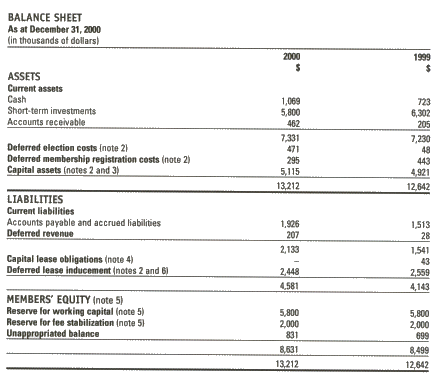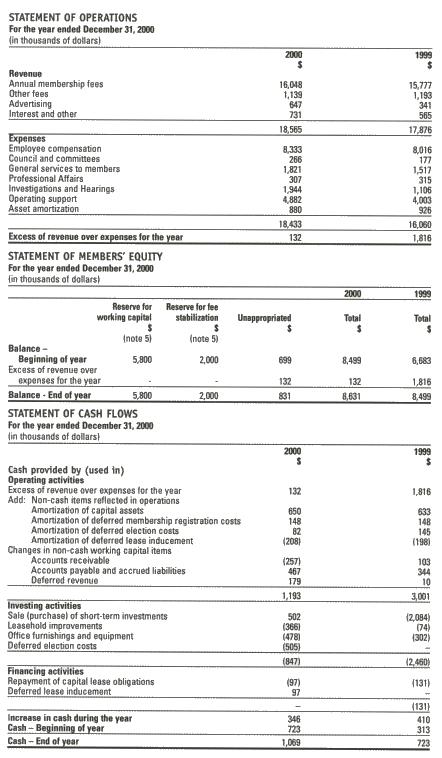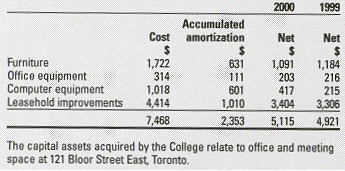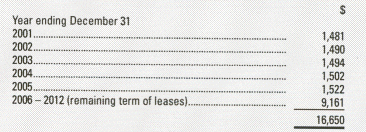Auditorsí Report
To the Members of the Ontario College of Teachers
We have audited the balance sheet of the Ontario College of Teachers as at December 31, 2000 and the statements of operations, membersí equity, and cash flows for the year then ended. These financial statements are the responsibility of the Collegeís management. Our responsibility is to express an opinion on these financial statements based on our audit. We conducted our audit in accordance with Canadian generally accepted auditing standards. Those standards require that we plan and perform an audit to obtain reasonable assurance whether the financial statements are free of material misstatement. An audit includes examining, on a test basis, evidence supporting the amounts and disclosures in the financial statements. An audit also includes assessing the accounting principles used and significant estimates made by management, as well as evaluating the overall financial statement presentation. In our opinion, these financial statements present fairly, in all material respects, the financial position of the College as at December 31, 2000 and the results of its operations and its cash flows for the year then ended in accordance with Canadian generally accepted accounting principles.


NOTES TO FINANCIAL STATEMENT
As of December 31, 2000
(tabular amounts in thousands of dollars)
1) Ontario College of Teachersí mandate
The Ontario College of Teachers (the College) was established by an Act of the Ontario Legislature, which was proclaimed on July 5, 1996. The College is an independent, self-regulating professional body with authority to license and regulate the practice of teaching in Ontario.
The affairs of the College are managed and administered by a Council comprised of 31 members, of whom 17 are members elected by the membership.
2) Summary of significant accounting policies
The financial statements of the College have been prepared in accordance with Canadian generally accepted accounting principles. The more significant aspects are:
Deferred election costs
Council elections are normally held every three years. The cost of conducting these elections is deferred and amortized over the term of the elected members.
Deferred membership registration costs
To establish an initial registry of members, the College launched a campaign to acquire names and addresses of Ontario teachers and validated eligibility against the Ministry of Education records. This initial cost is being amortized over six years, commencing in 1997.
Capital assets
Capital assets are recorded at historical cost and are amortized on a straight-line basis over their estimated useful lives, as follows:
Computer equipment................................................33-1/3% per annum Furniture and office equipment....................................10% per annum Leasehold improvements............................................over the remaining term of the lease
Deferred lease inducements
As described in note 6, the College is amortizing the lease inducements over the term of the respective leases.
Not-for-profit
As a not-for-profit professional membership organization, the College is not liable for income taxes.
Fair value of financial instruments
The carrying amounts of cash, short-term investments, accounts receivable, accounts payable and accrued liabilities approximate their fair values because of the near-term maturity of these instruments.
3) Capital assets

4) Capital lease obligations
The College has acquired computer hardware and other office equipment through leasing arrangements. At December 31, 2000, the College had capital lease obligations amounting to $43,000 (1999 - $140,000) at implicit rates of interest ranging from 6.7% to 8%. These capital lease obligations will be met during 2001.
5) Membersí equity and reserve accounts
The Council of the College has established two reserves of membersí equity balances. The first is a reserve for working capital, established in 1997 and 1998 in recognition of the need to provide working capital for continuing operations. The balance in the reserve for working capital as at December 31, 2000 is $5,800,000.
In 1999, the Council established a reserve for fee stabilization to help moderate the potential for fee increases in the immediate future. The balance in the reserve for fee stabilization as at December 31, 2000 is $2,000,000.
6) Commitments
a) Premises lease commitment
In September 1996, the College entered into a long-term lease agreement, which expires November 30, 2012. The lease is for office space at 121 Bloor Street East, Toronto. In addition to a rent-free period until November 30, 1997 (valued at $615,300), the College obtained an allowance for leasehold improvements of $2,356,891, which is repayable out of rental payments.
In June 2000, the College acquired additional leased space at 121 Bloor Street East for a period to March 31, 2006, which includes a rent-free period valued at $97,000. The estimated annual rental payments, including a provision for operating costs under the lease agreements, are as follows:

In accordance with guidance provided by the Canadian Institute of Chartered Accountants, the College reports an average rental cost for premises over the term of the lease agreements and amortizes the benefits of the lease inducements over the same periods.
b) Other operating lease commitments
The College has entered into various operating lease commitments for computer hardware and other office equipment. The estimated annual payments for these operating lease commitments are as follows:

7) Comparative amounts
Certain comparative amounts have been reclassified from those previously presented to conform with the presentation of the 2000 financial statements.

